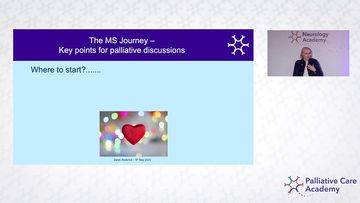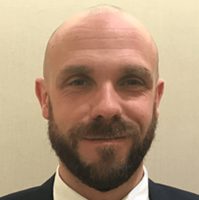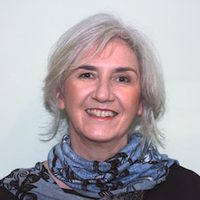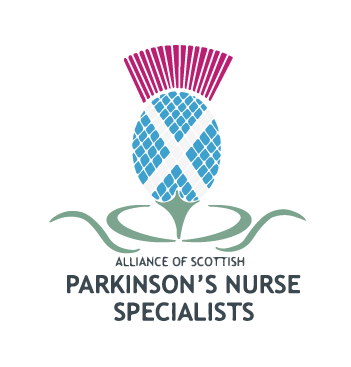Palliative Care Academy
For every person, at any stage
Spanning multiple neurological conditions, this Academy highlights the importance of palliative care throughout any disease trajectory, offering an expansive learning opportunity applied to several conditions.
For every person, at any stage
Palliative Care Academy challenges the idea of palliative care as a late-stage service. Whilst recognising the practical nuances and bespoke approaches needed in palliative care for people with dementia, Parkinson's, MS and motor neurone disease respectively, the Academy promotes a holistic and positive approach to palliative care at any stage of any condition.
Our Palliative Care MasterClass is for all health professionals involved in palliative care for neurological conditions – including allied health professionals, doctors (grade SpR and above), specialist nurses, community teams and GPs.
One of our few thematic courses, Palliative Care Academy unites specialists from a host of different backgrounds and skill sets as well as spanning a variety of neurological conditions. Examining the commonalities and principles of palliative care across the board, the course also zeros in on the nuances and needs particular to each individual condition, creating vibrant and varied discussions and a unique opportunity for cross-specialist sharing and collaboration.
Academic Director Dr Ed Richfield feels strongly that 'The principles of palliative care should be applied throughout someone’s journey' and advocates that palliative care begins with a good diagnosis. This fresh perspective on palliative care as a set of values to bring to any consultation or discussion with someone living with a neurological condition inspires change in individual practice and transformation of care at a grassroots level.
Our course format and learning style create an entirely transferable model which can be replicated for any disease area, whilst each courses' content is entirely unique. Our Palliative Care MasterClasses bring together a wide range of practitioners with varying skillsets and specialisms and our content is tailored to individual learning needs through a modular system.
Forthcoming Palliative Care Academy MasterClasses and events...
On Demand Webinars
Spanning multiple neurological conditions, this Academy highlights the importance of palliative care throughout any disease trajectory, offering an expansive learning opportunity applied to several conditions.
Who are these courses for?
The Palliative Care MasterClasses are aimed at all health professionals involved in palliative care for neurological conditions – including allied health professionals, doctors (grade SpR and above), specialist nurses, community teams and GPs.
Dr Ed Richfield, Palliative Care Academy faculty
The MasterClasses cover some of the following topics:
- Specific unmet palliative care needs in Parkinson’s, dementia, MS and MND
- Palliative assessment tools
- Disease-specific issues faced by patients
- Commonly encountered medications and their side effects
- Terminal stages – particularly how to identify and manage drug therapies in final days
- Service considerations and delivery
- Promoting autonomy – how and when to consider ACP in the context of cognitive impairment
- Examples of good practice, discussion of how such practice could be spread and incorporated elsewhere
- Future directions and research, quality improvement opportunities
MasterClass feedback
→ What delegates say about the course
Study grants
Potential funding opportunities may be available as follows:
- The British Geriatrics Society offer an educational grant, to apply, download their application form here.
- Parkinson’s UK may also fund up to £200 with a grant.
Palliative Care Academy
News and articles
Palliative care is for everyone
Every healthcare professional has a role in providing and supporting palliative discussions and services from the point of diagnosis all the way through to the end of life.For someone with a neurological condition, those conversations can happen with their specialist nurse, their occupational therapist, their consultant or their physiotherapist.






















